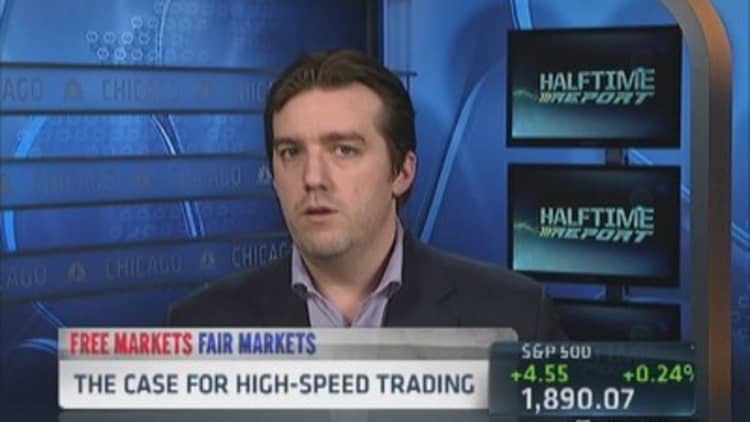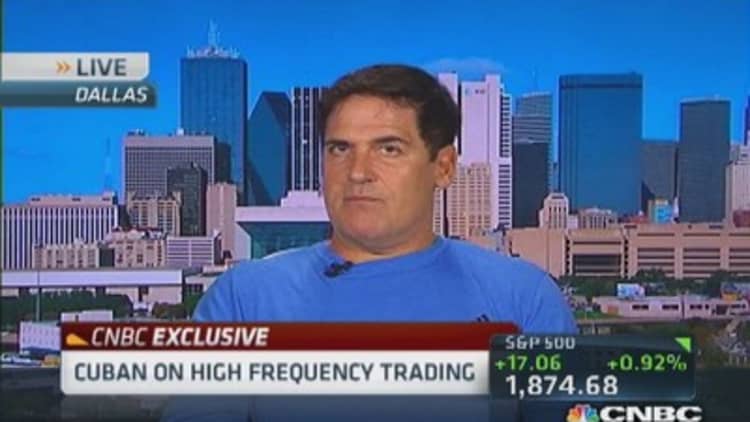
Despite recent widespread criticism of high-frequency trading, it's really a tool that has benefited the investment community, Peter Nabicht of Modern Markets Initiative said Wednesday on CNBC.
"I don't think you necessarily have to counter that high-frequency trading is predatory because it's not," he said. "High-frequency trading is simply a tool, a tool used by a wide variety of participants in the market for a wide variety of reasons. It's how they transact."

High-frequency trading made headlines this week with the release of "Flash Boys: A Wall Street Revolt" by Michael Lewis, who has said the stock market is "rigged."
Read MoreMichael Lewis' 'Flash Boys' and high-speed trading
Nabicht is a senior advisor at MMI, a firm "focused on demonstrating the benefits of algorithmic or quantitative trading."
On "Halftime Report," Nabicht contended that HFT has been positive.
"High-frequency trading benefited the investment community," he said.
HFT has lowered costs, tightened spreads and added liquidity to the markets, Nabicht said, adding that "not all high-frequency trading is predatory."
"I think there's a confusion here. I don't think high-frequency traders, professional traders, are competing with the general public. They compete with each other but not with the general public," he said. "Trading and investing are two very different things."
Read MoreMark Cuban rips high-frequency trading
Pressed on the question of whether HFT was "predatory," Nabicht declined to point a finger at the technology.
"I'm admitting that there is predatory behavior in the markets, whether it's high-frequency or not," he said. "Take for example, true, actual front running, having information no one else has about your customer's order and acting on that before that customer order goes to market. That would be predatory."
Stephen Weiss of Short Hills Capital took issue with Nabicht's argument, citing the case of Virtu Financial, a high-frequency trading firm that lost money one day out of 1,238 days of trading, according to its S-1 regulatory filing.
Read MoreHFT 'rigged' debate gets hotter, may claim Virtu as victim
"How do you do that unless you have an advantage that nobody else has? And that advantage is looking into the average order and getting in front of it," he said. "They're not adding liquidity. They're sucking it out and returning it at a higher price after they've scalped you."
Nabicht countered: "Looking at the daily summarization of all of their profitability is not the right way to go. You need to go trade by trade. I am certain that Virtu hasn't only lost money in one trade."
HFT has improved efficiency, and Virtu was no different than a grocery store in providing a service for which there was demand, he said.
Read MoreThe fight that stopped trading on the floor of the NYSE
"High-frequency trading and automated trading allow trading firms to scale greatly across many, many platforms, many products, many asset classes. The fact that they can do that in a cost-efficient way means that they can trade in a variety of places all day long," Nabicht said.
"Now, they're not executing customer flow. They're executing their own trades and their own strategies. They could be having a bad time in one market and move to another market. They could be doing poorly in one asset class and focus more on another asset class that day. Diversification in providing liquidity into the markets, basically being the service provider to the market, you're going to have the majority of your days be profitable if you're good at it."
He added: "Grocery stores are profitable, wildly profitable, the vast amount of time. They're a service provider. They're providing a supply to a demanding public. That's what Virtu's doing. They're providing a supply to a demanding public."
Nabicht said that the Securities and Exchange Commission should consider revamping its Regulation National Market System, or Reg NMS, the 2007 initiative that was intended to modernize U.S. stock markets.
"I think we should do a holistic review of Reg NMS, like many of the SEC commissioners have called for, because if we do that, we can start looking at ways where we can simplify the market structure. The less complex the market structure is, the easier it's going to be to police the markets, to remove bad actors and to find those places that aren't beneficial to end investors," he said.
"That's what it's really about, is making sure that we have a beneficial marketplace for end investors."
—By CNBC's Bruno J. Navarro.


